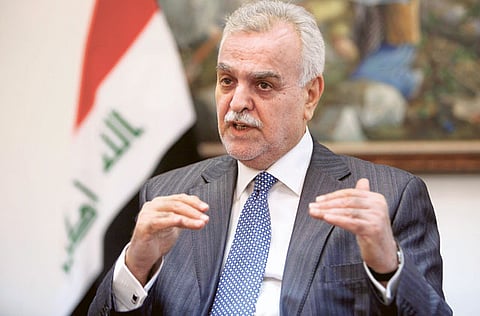Iraq faces terror of another kind
The fact that political blocs resort to violence in the country to settle scores is intolerable

Tend to your personal matters, maid dismissed due to the drawdown" read a big sign in one of Iraq's US camps a few weeks ago when the US forces withdrawal was at its height.
With the last of the US boots moving out of the country after eight years, few felt relieved, as everyone knew that Iraq's fragile stability and safety would be handed a blow.
However, very few people in Iraq today can blame Prime Minister Nouri Al Maliki for his audacious moves against two of Iraq's senior politicians, Vice-President Tarek Al Hashemi and Deputy Prime Minister Saleh Al Mutlaq as both men are a reminder of the pre-2003 era, when Iraq was under the tyranny of the Baathist regime.
Al Hashemi, who is a member of the Al Iraqiya bloc, is accused of backing terrorism, and the Supreme Judicial Council in Baghdad issued an arrest warrant after a number of his bodyguards confessed to carrying out terrorist acts.
The Al Iraqiya bloc headed by Dr Ayad Allawi mishandled the problem by boycotting the parliament, which may easily lead to additional deterioration in stability and security.
Soon after the US drawdown was complete, a number of coordinated terrorist attacks in Baghdad took place leaving more than 70 dead and hundreds injured.
An extremist group, which is part of the Islamic State of Iraq, which includes Al Qaida, claimed responsibility for what they called the "Thursday raid".
Iraqi politicians need a better understanding of democracy.
The US brought democracy to Iraq, but they either did not give Iraqi politicians the manual, or Iraqis failed to listen. Hence Iraqi politicians understood US democracy in their own way.
Sadly, Iraqi politicians got it all wrong, as democracy does not mean that everyone rules. Democracy entails a joint structure in ruling, but that does not mean that everyone gets to be president.
Constructive criticism
Democracy means that there are those who rule and those who judge and offer constructive criticism, in other words, an administration and an opposition who work together as two sides of one equation for the good and prosperity of the country.
There is no such thing as a coordinated democracy, as this only exists in the minds of some politicians and political blocs in Iraq.
If such a democracy exists, why conduct elections in the first place? It would have been cheaper — as the last 2010 elections cost the Iraq an arm and a leg — and safer to meet up and choose representatives from all sects and ethnic groups in the country according to their percentage in the population.
During the past eight years, the government was only concerned with security and stability issues. All through that time, it was not judged for its performance in the development, economic, or any other sector, but rather for its ability to maintain security against the phantom of Iraq's opera.
Pending laws
The ghost looming over Iraq is called "Al Qaida" and in reality it is a cocktail of different forces —Baathists, small time highway robbers, money launderers, Iraqi militias affiliated to different political blocs, neighbouring countries with special agendas — you name them, they are there.
The danger of Al Qaida alone is tolerable, but the fact that political blocs resort to terrorism in the country to settle political scores is intolerable.
Al Qaida Inc. was successful in transforming all issues to the security folder; and frankly, who can blame the average Iraqi for judging the government through its security successes or failures, for without security, nothing works and life comes to a standstill. As a result of the competition and clashes between Iraqi politicians for ultimate power, the Iraqi Parliament has been marginalised. No laws have been passed and nothing serious takes place in the House.
After eight and a half years, the most important law for Iraq's livelihood — Iraq's oil and gas law — is still pending and may never see the light of day.
The saddest thing is that no one takes the Iraqi parliament seriously. When key officials are held accountable for their deeds in Parliament and are questioned, no serious measure is taken against them by any authority, which leaves Iraqis wondering why the questioning was conducted in the first place.
As former US General David Petraeus told me in an interview back in 2007, when Iraq was just settling down after two years of a civil war of blood, sweat and tears, "Democracy is to shout and not shoot".
Iraqi leaders have not sat seriously together to try to reach a solution regarding a country which can easily fall apart. When and if they do, the light at the end of Iraq's tunnel will become a blazing sun of hope. But until that happens, Iraq will remain a battle zone.


